Other
- "The Bronze Medal", a song by Idlewild from the 2000 album 100 Broken Windows
A bronze medal is awarded to the third-place finisher of contests or competitions, usually in sports.
Bronze Medal may also refer to:
The Bronze Star Medal (BSM) is a United States Armed Forces decoration awarded to members of the United States Armed Forces for either heroic achievement, heroic service, meritorious achievement, or meritorious service in a combat zone.

The Silver Star Medal (SSM) is the United States Armed Forces' third-highest military decoration for valor in combat. The Silver Star Medal is awarded primarily to members of the United States Armed Forces for gallantry in action against an enemy of the United States.
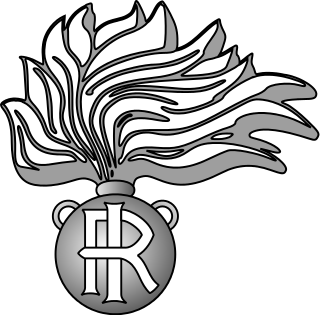
The Carabinieri are the national gendarmerie of Italy who primarily carry out domestic and foreign policing duties. It is one of Italy's main law enforcement agencies, alongside the Polizia di Stato and the Guardia di Finanza. As with the Guardia di Finanza but in contrast to the Polizia di Stato, the Carabinieri are a military force. As the fourth branch of the Italian Armed Forces, they come under the authority of the Ministry of Defence; for activities related to inland public order and security, they functionally depend on the Ministry of the Interior. In practice, there is a significant overlap between the jurisdiction of the Polizia di Stato and Carabinieri, although both of them are contactable through 112, the European Union's Single Emergency number. Unlike the Polizia di Stato, the Carabinieri have responsibility for policing the military, and a number of members regularly participate in military missions abroad.
The Commendation Medal is a mid-level United States military decoration presented for sustained acts of heroism or meritorious service. Each branch of the United States Armed Forces issues its own version of the Commendation Medal, with a fifth version existing for acts of joint military service performed under the Department of Defense.
The Silver Medal of Military Valor is an Italian medal for gallantry.
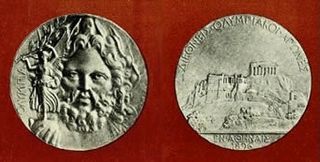
A silver medal in sports and other similar areas involving competition is a medal made of, or plated with, silver awarded to the second-place finisher, or runner-up, of contests or competitions such as the Olympic Games, Commonwealth Games, etc. The outright winner receives a gold medal and the third place a bronze medal. More generally, silver is traditionally a metal sometimes used for all types of high-quality medals, including artistic ones.
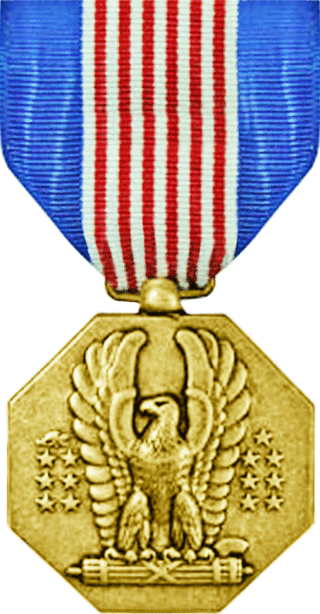
The Soldier's Medal is an individual decoration of the United States Army. It was introduced as Section 11 of the Air Corps Act, passed by the Congress of the United States on July 2, 1926. The Soldier's Medal is equivalent to the Navy and Marine Corps Medal, the Air and Space Forces' Airman's Medal, and the Coast Guard Medal. Prior to the creation of the Airman's Medal in 1960, airmen were awarded the Soldier's Medal.
A "V" device is a metal 1⁄4-inch (6.4 mm) capital letter "V" with serifs which, when worn on certain decorations awarded by the United States Armed Forces, distinguishes an award for heroism or valor in combat instead of for meritorious service or achievement.
The Citation Star was a Department of War personal valor decoration issued as a ribbon device which was first established by the United States Congress on July 9, 1918. When awarded, a 3⁄16-inch (4.8 mm) silver star was placed on the suspension ribbon and service ribbon of the World War I Victory Medal to denote a Citation (certificate) for "Gallantry In Action" was awarded to a soldier, or to a marine or attached to the Army's Second Division, American Expeditionary Forces. The Citation Star was replaced in 1932 with the introduction of the Silver Star Medal.

United States law enforcement decorations are awarded by the police forces of the United States of America. Since the United States has a decentralized police force, with separate independent departments existing on the state and local level, there are thousands of law enforcement decorations in existence.

The awards and decorations of Civil Air Patrol are "designed to recognize heroism, service, and program achievements" of members of Civil Air Patrol (CAP) of the United States of America. The CAP is the official auxiliary of the United States Air Force. These awards are made to improve the esprit de corps of members. These awards are all worn in the form of medals or ribbons and all are considered civilian decorations. Civil Air Patrol regulations allow them to only be worn and displayed on appropriate CAP uniforms. In order to be considered for one of these awards, an individual must be a member in good standing of Civil Air Patrol at the time of the act being recognized. There is a statute of limitations for these awards and all recommendations must be submitted within 2 years of the act being performed. It is possible for the next of kin of deceased persons to be presented awards to which a member was entitled, but which he or she did not receive. Award review boards are established at the region, wing, group, and squadron levels to consider recommendations for all awards and decorations.
Awards and decorations of the United States Department of the Air Force are military decorations which are issued by the Department of the Air Force to airmen of the United States Air Force and guardians of the United States Space Force and members of other military branches serving under Air Force and Space Force commands.
Awards and decorations of the United States government are civilian awards of the U.S. federal government which are typically issued for sustained meritorious service, in a civilian capacity, while serving in the U.S. federal government. Certain U.S. government awards may also be issued to military personnel of the United States Armed Forces and be worn in conjunction with awards and decorations of the United States military. In order of precedence, those U.S. non-military awards and decorations authorized for wear are worn after U.S. military personal decorations and unit awards and before U.S. military campaign and service awards.

Paul John Kern is a retired United States Army general and businessman. He served as Commanding General of the United States Army Materiel Command from October 2001 to November 2004. He became President and Chief Operating Officer of AM General LLC on August 1, 2008.
The Medal of Military Valor is an Italian medal, originally established as a Sardinian award. It is awarded to military personnel, units above the level of company, and civilians for exceptional valor in the face of the enemy.
The Legion of Valor of the United States of America, commonly known as the Legion of Valor, is a war veterans' organization created to promote patriotic allegiance, fidelity to the United States Constitution, and popular support for civil liberties and the permanence of free institutions. Membership is open to recipients of the Medal of Honor, the Distinguished Service Cross, the Navy Cross, and the Air Force Cross.
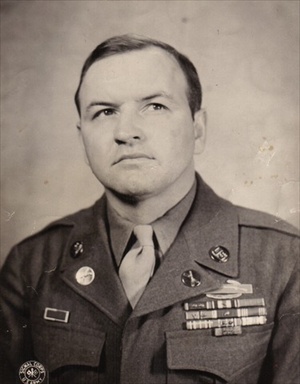
Llewellyn Morris Chilson was a United States Army master sergeant and one of the most decorated American soldiers of World War II. He received twelve individual decorations for combat from the U.S. Army including seven decorations for valor. After the war, the President of the United States personally decorated Chilson with seven decorations including three Distinguished Services Crosses for extraordinary heroism in Germany.
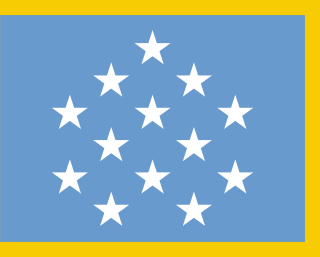
The Medal of Honor (MOH) is the United States Armed Forces' highest military decoration and is awarded to recognize American soldiers, sailors, marines, airmen, guardians and coast guardsmen who have distinguished themselves by acts of valor. The medal is normally awarded by the president of the United States, but as it is presented "in the name of the United States Congress", it is sometimes erroneously referred to as the "Congressional Medal of Honor".
The awards for Civil Valor are the honors the Italian Republic grants in order to "reward acts of exceptional courage that clearly manifest civic virtue and to recognize the recipients as worthy of public honor". Individual citizens can receive the award, and it can also be bestowed collectively on all members of a military department or all residents of a municipality, city, or province when they have knowingly exposed their life to manifest danger.